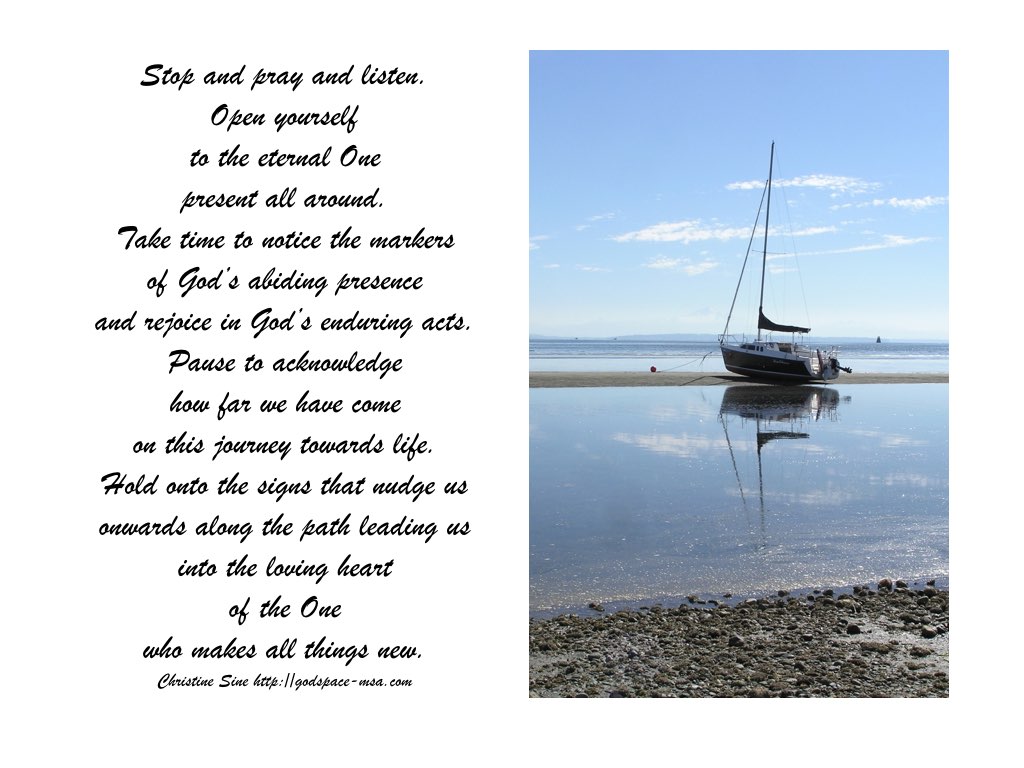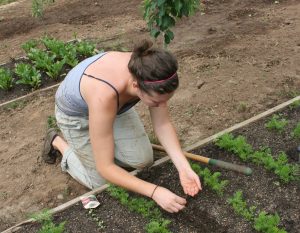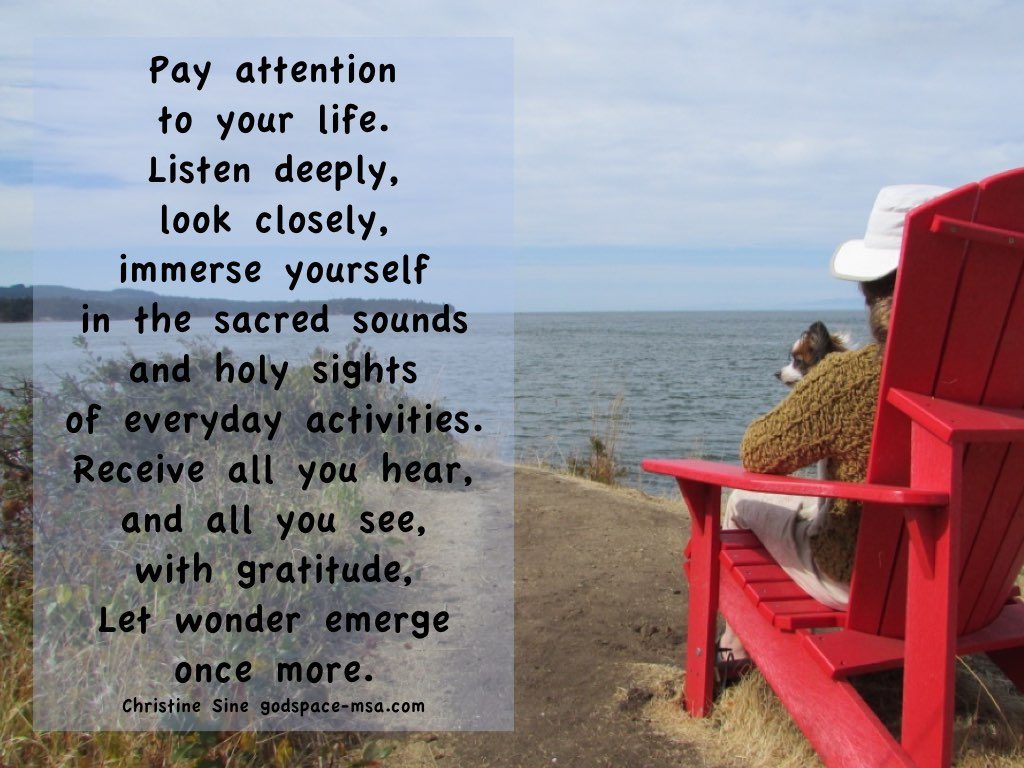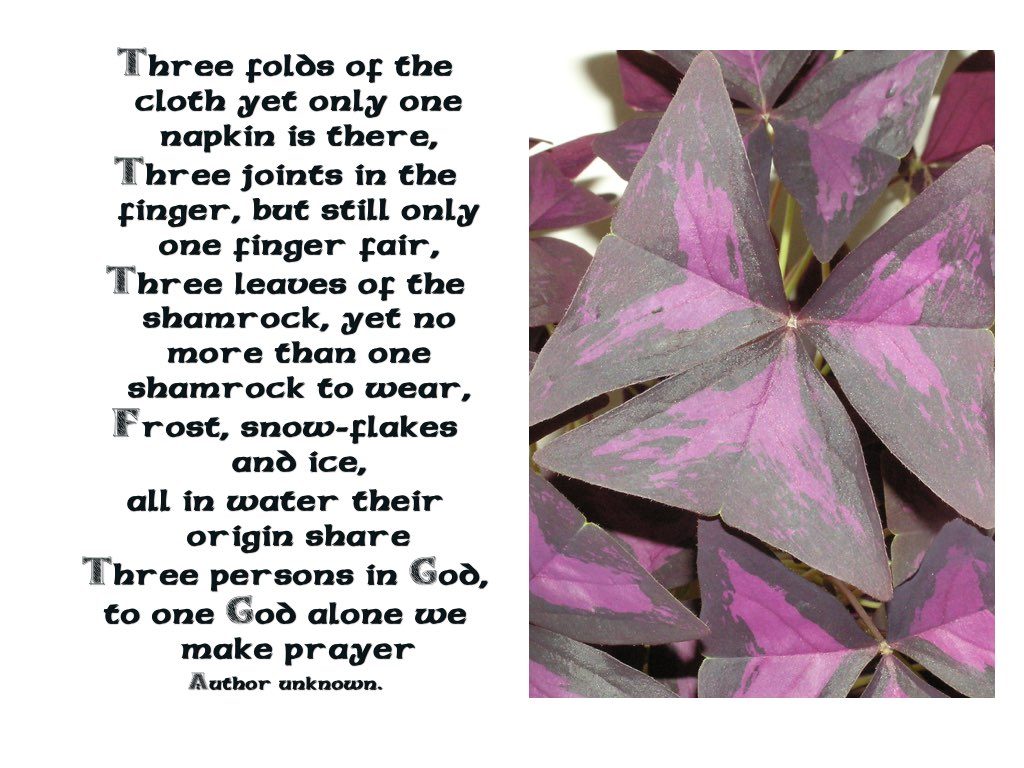By Andy Wade –
He also told them a parable: “No one tears a piece from a new garment and sews it on an old garment; otherwise the new will be torn, and the piece from the new will not match the old. And no one puts new wine into old wineskins; otherwise the new wine will burst the skins and will be spilled, and the skins will be destroyed. But new wine must be put into fresh wineskins. Luke 5:36-38
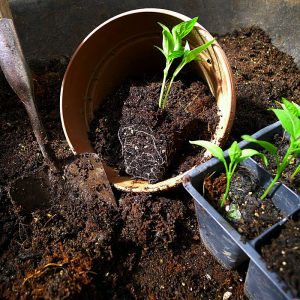 This verse was swirling through my head as I re-potted plant starts. I imagined the roots trying to burst the pots as they out grew their containers. For many of my plants, it’s important to start the seeds in smaller containers so you can more easily monitor temperature and moisture. But as these plants grow, if it’s still too early to set them out into the garden, they need to be re-potted so the roots don’t knot up (become root bound) and the plants become sick.
This verse was swirling through my head as I re-potted plant starts. I imagined the roots trying to burst the pots as they out grew their containers. For many of my plants, it’s important to start the seeds in smaller containers so you can more easily monitor temperature and moisture. But as these plants grow, if it’s still too early to set them out into the garden, they need to be re-potted so the roots don’t knot up (become root bound) and the plants become sick.
As I re-potted my plants, I thought about the fact that all these roots sprang from the same seed. From that tiny beginning I already had a bundle of roots too numerous for their current container. A good start is essential to the overall health and longevity of a plant. Without a good start, the gardener is often forced to start over from scratch. But with a good start, she can soon set her sights on the future.
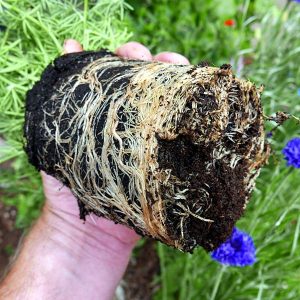 As the plant grows, it would be silly to keep it confined in the small container it was started in. Attempting to keep the plant cramped into such a small box would certainly lead to diminished growth, weakening the young shoot and crippling it from reaching its full potential, possibly even killing it altogether.
As the plant grows, it would be silly to keep it confined in the small container it was started in. Attempting to keep the plant cramped into such a small box would certainly lead to diminished growth, weakening the young shoot and crippling it from reaching its full potential, possibly even killing it altogether.
What seems obvious as a gardener is not always obvious when it comes to the spiritual life. When a new movement of God comes around I’m quite content to try to squeeze this new wine into old, inflexible wineskins and go merrily on my way. But by failing to look closely at the underlying assumptions associated with that old wineskin, I’m likely restricting the move into new things that God is offering.
I began to wonder how many times I’ve given up on something I thought was of God but got frustrated with it because it just wasn’t working out. Maybe God was calling me to step into a completely different container. Maybe what God had planned was just too big to fit into my puny assumptions. Maybe God was calling me into a little soul-soil disruption so that my roots could be un-bound, so that I could thrive in a new work that was bigger than I could ask or even imagine (Eph. 3:20).
Two Dangers: Moving On Too Quickly and Being Reluctant to Move at All
We live in times of constant change. When it comes to consuming, we’ve bought into the lie of “New and Improved”, purchasing new things before the old ones have worn out and salivating over the next new gadget to make our lives “better”. I’ve seen this issue infiltrate churches as they flit from program to program, the “latest great idea”, before giving the last “great idea” a chance to prove its worth. Whether springing from impatience at not seeing fast enough “results” or the perceived need to always be on the cutting edge, moving forward too quickly can kill a community just as effectively as an unwillingness to change.
But times are changing. Communities are changing. Assumptions and attitudes are changing. Sticking with Jesus’ parable, perhaps the new wine is from old grape vines but a new season, or from new vines producing their first crop. Either way it’s still new wine in a new season, which requires new wineskins. The old container is no longer suitable for the new things of God.
Back to my garden: I re-pot my tomatoes at least once, often twice, before they go into the yard. With tomatoes, a few things are at play. There’s a kind of incubation period in the greenhouse as plants develop below and above the soil. Plants take time to develop a healthy root system before they’re ready to be set out in the garden neighborhood. Both the plant and the garden neighborhood need to be ready.
With tomatoes there’s another interesting element at play. When I re-pot the plant, I carefully snip off the bottom several branches and bury the plant half-again its height into the soil. This approach appears counter-intuitive at first. Now my plants are half as tall with fewer branches and less foliage. But all those tiny hairs on the stalk of my tomato plant will now form new roots, easily doubling the root system that nourishes the plant. What’s lost in initial height is more than made up for in health and stability for the long-term.
Even before I plant the first seed I’ve closely observed my garden environment. I’ve pre-determined which plants will grow best, where in my garden they will be located, and what “neighbors” I will plant near them. Once the seeds are planted I need to monitor the plants and determine the right timing for re-potting. I need to read the environment outside and decide, based on the weather trends for this season, when is the best time to transplant them outside. With my tomatoes, I have the added opportunity to enhance their ability to thrive by further developing their root system prior to moving them into the garden. It’s not just a matter of a new pot or a new wineskin.
Looking back over my church and community involvements over the past thirty years, whether in Seattle, Hong Kong, or Hood River, I realize just how important these lessons from the garden are as I find myself asking:
- What areas of my life or ministry have become root-bound? Did I resist being “re-potted” or did I just not even ask if the current container was still appropriate to the task?
- Are there places I’ve moved on from too quickly? Why? What were the underlying assumptions, fears, or anxieties which prompted me to run ahead of God?
- Is God doing a new thing in my life/community/neighborhood? How can I best discern when the “temperature” is right to plant? Would there be an advantage to delaying in order to further develop the “root system” for greater vitality and longevity?
- Have I considered the broader “garden neighborhood”? How might this new initiative relate to the people and other things already going on in the community? Does this change how, when, and where I plant?
What are your thoughts?
It is six months since we transitioned Godspace from my personal blog to a community blog with over 40 voices from 8 different countries – and the numbers keep climbing. A couple of months ago we initiated another new practice, our “author of the month” feature. We work hard to provide stimulating content that will stir your imagination, establish sustainable practices and deepen your faith. We are glad that so many are able to use the resources provided, not just in your personal formation but in that of your churches too. Thank you for your enthusiastic response to all we are doing. Please help spread the word and encourage your friends to subscribe to the blog.
Come Listen with Us in the Next Few Months.
So what’s happening over the next few months? Our focus will be on listening. So often we listen without really hearing. We spout answers without really listening to the questions. We talk when we should be silent. Yet God so often encourages us to listen, to pay attention and to keep silent. There is much for us to learn as we listen to each other, to the ancient followers of Jesus and to Jesus himself. Exploring many dimensions of the art of listening will draw all of us closer to our triune God and to the ways of God’s kingdom.
In June we will explore the art of listening, publishing a new resource list compiled by our authors and featuring Keith Anderson and his inspiring new book A Spirituality of Listening. In July we will listen to the Celtic saints in preparation for our 25th Annual Celtic retreat, Celebrating with all the Saints, and in August we will explore what it means to listen to the life of Jesus. One of our authors, Nils Von Kalm commented: Our creeds talk about Jesus’ birth and then move straight to his death and resurrection but skip over his life when most of the gospels are devoted to that.
Come Commemorate the Saints and the Celebrations of our Cultures.
We are also planning some special posts to mark the feast days of our favourite saints and to commemorate significant days in our cultures. Here is a glimpse of what is coming:
JUNE
- 9th – St. Columba – Michael Moore, Christine Sine
- 19th – Father’s Day (some countries) Keren Dibbens-Wyatt
- 20th – World Refugee Day – Ellen Haroutunian
JULY
- 11th – St Benedict – Nurya Love Parish
- 17th – World International Day of Justice – Steve Wickham
- 18th – Nelson Mandela International Day – Rowan Wyatt, Jenneth Grazer, Ellen Haroutunian.
AUGUST
- 5th-7th – MSA Celtic Prayer Retreat liturgies and prayers– Christine Sine, Andy Wade, Luke Winslow
- 30th – World Kitchen Garden Day
- 31st – St. Aiden – Michael Moore
If you would like to provide a post or prayer for another significant celebration please let us know.
This promises to be an exciting season for us. We appreciate your continued support, prayers and feedback as we move forward.
Jonathan is the administrative director of a farm box cooperative in Portland called Tuv Ha’aretz, Hebrew for “goodness of the earth.” Tuv Ha’Aretz is part of a Jewish food movement across the country bringing together local farms and ancient agricultural and spiritual traditions of Judaism. Produce in the boxes comes from local and sustainable farms, wrapped in Jewish culture and faith.
Jonathan drove out to see what we are up to at Fern Creek with our CSA (Community Supported Agriculture) enterprise. After a farm tour, the three of us sat and drank coffee and hot chocolate on the picnic table shaded by the forest behind it. He pulled out his notebook and we began a conversation that wound its way through history, faith and spirituality as it relates to food, Jewish rituals associated with blessing, contemporary challenges to good and ethical eating, and his dreams for what’s possible to heal people, to learn from elders and the wisdom of our traditions, and to connect communities to sustainable, local food.
We all left that conversation inspired and encouraged.
“Eat, be satisfied, and bless” is the motto of Tuv Ha’Aretz, and the blessing part has stuck with me since Jonathan’s visit. Historically Jews offered a hundred blessings, or bracha, a day, a practice honored by some contemporary Jews as well. A hundred blessings a day averages about one every ten minutes during waking hours, and while there are specific blessings in the Jewish tradition, I thought about how saying 100 blessings (or so) a day can’t help but put one into a posture of gratitude. If at some point in the day we bless the air we breathe, the water we drink, the house we live in, flowers and trees growing outside, might life be richer, might we be more humble regarding how we live it?
What if I took a moment to bless this time I have to write, to bless words themselves, and the grounding given me by my Judeo-Christian heritage? In a moment I’m going to go make a mocha; what if, while the soymilk steams, I say a blessing for the farmers and laborers, the cocoa, coffee, and soy plants, the land that grew it all, and the bees who make the honey I’ll use to sweeten it? I can hardly imagine living this way, but want to make blessing feel less optional, and more a natural outpouring of living my Christian life. Saying blessings is less about tacking a spiritual discipline onto my must-do list than it is about using my head, heart, and body to bless and to be grateful rather than allowing my mind to wander aimlessly, picking up this worry or that, festering over some offense or embarrassing moment, or scheming somehow for more recognition, achievement, stuff, or love.
Blessing leans us into the reality that we belong to something bigger than ourselves, and are in an interdependent relationship with other individuals, with ever-widening community circles (family, church, city, state, nation, world), and with God’s creation itself.
As our conversation with Jonathan meandered we landed on what it means to live an embodied faith, not just one attending to our hearts and minds. So how we feed ourselves (what we eat, yes, but also where food comes from and how it is grown and harvested) is part of lived-out embodied faith. Might living from an outpouring of blessing lead us to more compassionate and gracious choices? Similarly, what might it look like to learn to listen to what our bodies have to say to our mind and soul as we make our way through our days? For example, any time we find ourselves on our knees or laying down, might it be an invitation to humility, to gratitude, to letting go of control?
Mark and I are on our knees a lot these days, and not primarily because we have toddler grandchildren, though there is that, too. We plant baby cabbage, broccoli, and kale on our knees; some of our weeding and harvesting is done as we kneel.
A day or so after Jonathan’s visit I was kneeling by the onions, weeding out grass growing too close to the onions to use a hoe. I paused to bless the soil, the worms, and other microbes living out their God-given creaturely lives. Last week we planted tomato starts, and this week eggplant and peppers, and while I didn’t manage to be mindful with every planting, I wondered how it would change my relationship to these plants, to Fern Creek, to our CSA members who will eat of the bounty, to God, if I blessed every plant as I set it into the soil.
On most days after Mark and I have worked together on our various farming tasks, we walk down toward to creek to spend a few minutes in the hammock before heading back up the hill and inside to fix dinner. The hammock stretches between an old oak tree and a younger Douglas fir, and from spring through fall we are well shaded by the canopy above us. We gently sway, often in silence—Mark napping, and me listening to the creek, birds, squirrels, and the occasional car, helicopter, or airplane. Setting our bodies down, lying down—could that become an opportunity to bless the bodies that allow us to do the work we do? To recognize there comes a time to stop, and blessing the stopping of work at the end of the day as being just as good and important as the work itself? In the stopping we recognize that our greatest responsibility in the end may be less about getting some job done than working with integrity, humility, and gratitude.
As we wrapped up our conversation with Jonathan he said, “I have one more question: how can I keep you in my life?”
“We should share a meal together,” I said.
He smiled, and said, “Yes, of course, we should eat together.” 
What does it mean to pay attention to your life? I am contemplating that question as I sit in my quiet place listening to the birds sing and watching the mountains glow in the early morning light. Paying attention is about taking notice to ourselves, God, our neighbours and the earth on which we live.
Pay Attention to your body
Taking notice of my body is first about my physical body. What are the signals that tell me I am going too fast or too slow? What are the promptings that make me aware I am not getting enough exercise or eating the right food and neglecting my health? These are the questions I contemplate as I sit and listen to my body.
Over the last few weeks I have been keeping a record of my daily steps and exercise as well as counting my calories. I realize with horror that I am far more sedentary than I thought. Sitting for long periods is not good for me – for my heart, my muscles or my bones – and I need to change.
Pay Attention to your Soul
I am also learning to pay better attention to my soul and the emotions that simmer beneath the surface, easily ignored in the busy priority of work and hospitality. There are currents of joy, pain, tension, quiet longings and frantic desires. They all need to be paid attention to. What gives me joy? What depresses me? What breaks my heart? What are the implications for my life, my relationship to others and to God?
Tend Your Spirit
My spirit also needs tending and often the condition of the space in which I sit reflects the state of my spirit. Mess means a chaotic spirit, easily distracted by bits and pieces of work projects I spread around me. Computer open first thing in the morning means social media has taken priority over God.
How close do I feel to God today? What have I done to nourish that closeness? How have I pushed God away. Creating a space for Godtime requires a deliberate act of placing my computer under my desk and stacking my work into a neat pile that does not distract me.
Take Notice of God’s World
Celtic Christians believed that creation was translucent and the glory of God shone through. A raindrop, a ripe strawberry, even a broken branch reflect something of who God is. I know that is true but unless I take the time to look and listen and touch I don’t see that glory.
Pay Attention to God’s People
All people are God’s people, made in God’s image to reflect who God is. Even the most broken people (and we are all broken people) can draw us closer to the God we love. Yet we easily listen to some and dismiss others. We pay attention to those we like or whose opinions we agree with and ignore or demonize others who think, look or worship differently. We sit in fellowship with those who make us comfortable and distance ourselves from those who make us uncomfortable.
Who do you listen to? Who helps you relax? Who do you ignore?
These are questions I find myself grappling with more and more. The more intentionally I take time and create space for these questions to pay attention, the more grateful I become for all the ordinary, mundane aspects of life, the closer I feel to God and the more my life becomes immersed in the awe and wonder of all God has created.
What is Your Response?
Watch the video below. What encourages you to pay attention to God’s world, to your inner self and to God’s people around you? What makes you dance to the music of God’s world and the song of God’s voice?
By Lynn Domina
Several years ago, as we dawdled over pancakes and eggs in an upstate New York diner, I debated with a friend about the nature of the Trinity. I thought I was being flexible when I said that three wasn’t the crucial number for me, that God could be expressed in four or five or even more aspects, that the persons of God could multiply well above three. “Ah,” he said, “but could it be fewer?” I was startled by that question, but I knew the answer immediately: “No.”
I’m not one who spends much psychic energy on doctrine, but I care a lot about community. That’s why I love the Trinity, because it shows us that God’s fundamental identity is communal. God does not exist as an isolated being, or even as an exclusive pair. The Trinity reveals God’s inclusive nature. And we are each individually created in the image of God, yes, but we are also created as a community in the image of God.
Part of the reason I don’t pay much attention to some doctrinal arguments is that they don’t seem to matter much in the ordinary lives and struggles of most believers. But for me, understanding the Trinity does matter—if God is an inclusive community, then we are called to manifest inclusive communities in our own lives. We are called to invite others in, to acknowledge not only their creation as images of God but also to realize that our communities reflect God more and more fully as they become more and more inclusive. Yes, I’m talking here about people who are different from us in broad sweeps—race, class, gender, sexuality, etc.—but I’m also talking about closer, often more irritating differences—the kid who plays his bad music so loudly, as if to drown out his bad muffler; the old guy next door who gripes so much when a child’s ball rolls onto his lawn; the neighbors across the way who litter their yard with multiple campaign signs for the wrong candidate. The Holy Spirit enlivens each one of them, and God speaks to all of them in their own languages.
One of the greatest Biblical values is hospitality, and the Trinity embodies that value. Differences not only coexist but are actively welcome. As images of God, we are united through that welcome, not through some superficial similarity. We are called to recognize humanity in community, just as God reveals divinity as community. The reality of the Trinity confirms that God does not exist outside of relationship.
Like many of us, I memorized certain things about the Trinity; I learned terms like “Father, Son, and Holy Spirit” or “Creator, Redeemer, and Sanctifier,” but they didn’t help me understand much about God, and those terms certainly didn’t help me internalize what I thought I knew. I’d heard about the folded arms of medieval pretzels and about St. Patrick’s shamrocks. These images seemed accurate enough in representing the idea of “three in one,” but I didn’t find much depth in them. Then I heard a sermon in which the preacher proposed other metaphors, drawing on other theologians, and I began to wonder about my own images and figures of speech. God is the composer, I thought, and God is the violin, and God is the music. God is the tinder, and God is the match, and God is the flame. God is the cloud, and God is the rain, and God is the parched earth.
What metaphors would you create to express your understanding of the Trinity? What images can you offer to help the rest of us deepen our devotion?
By Lynne Baab
Trinity Sunday is May 22nd this year.
1. Late elementary school. My parents take me to church every Sunday but we never, never talk about God at home. Prayers and hymns at church leave me with the idea that God is a bit mysterious in his holiness, and that humans can rest in this mystery and enjoy God’s otherness. The notion of the Trinity enhances this sense of mystery. I love the analogies of water in three forms (steam, liquid and ice) and the three leaves of one shamrock. How can we understand this three-in-one? Why would we want to? Our job is to enjoy it. My childhood heart is lifted up because of this great mystery.
2. My thirties. I am a student at Fuller Theological Seminary, and my favorite professor is Ray Anderson. In his theology classes, he often talks about the relationship between the three persons of the Trinity. Jesus, he says, is eternally submissive to his Father, obeying his Father and giving him glory. After the Incarnation, he says, the Holy Spirit is permanently stamped with the personality of Jesus. To experience the Holy Spirit is to experience Jesus. We are invited to obey the Father, like Jesus did and does. We are invited to serve and love in the world like Jesus did and does, through the power of the Holy Spirit. We are invited to join with each member of the Trinity, giving praise and glory to the other members of the Trinity. My heart is filled with wonder because I am invited to join into something so huge and beautiful.
3. My forties. I write several books about congregational issues, and my publisher, The Alban Institute, markets to Unitarian as well as Christian congregations. So, along with my interviews in Christian churches, I also interview numerous Unitarians and visit several Unitarian Universalist congregations. The Unitarians I meet are lovely people: good hearted, caring, deep thinkers. Along with my interview questions about how their congregations work, I ask questions about their spirituality. Later I reflect on the differences between what they say as Unitarians and what I believe as a Trinitarian Christian, and I come to the conclusion the difference is the location and personality of the holy/sacred. Christians believe that the holy/sacred has come to earth from heaven in a person, Jesus Christ, and that through the sending of the Holy Spirit, God remains present with humans. God is here in the Holy Spirit, stamped eternally with the personality of Jesus Christ. God is also in heaven. My heart sings with joy at the generosity of a God who would be so close to us and yet also transcendent, holy and exalted.
4. My fifties. I am hired as a lecturer in pastoral theology in a department with two systematic theologians who have a lot to say about the Trinity. I listen to them, and the graduate students they supervise, as they present seminars and public lectures. The theologians and students emphasize the communal nature of the Trinity, that we are called into relationship with a relational Trinity, who then empowers us to be in human community. I am invited to write a chapter for a book on online community, so I read Being as Communion by the great Eastern Orthodox theologian, John Zizioulas, who argues that to be human is to be in relationship because of the nature of the God in whose image we are created. I am stretched by this call to love, and my heart rejoices at the beauty of this communal God, whose three-in-oneness has illuminated my life ever since childhood.
Holy, holy, holy! Lord God Almighty!
All thy works shall praise thy name, in earth and sky and sea.
Holy, holy, holy! Merciful and mighty,
God in three persons, blessed Trinity.
(Reginald Heber, 1783–1826)
As an Amazon Associate, I receive a small amount for purchases made through appropriate links.
Thank you for supporting Godspace in this way.
When referencing or quoting Godspace Light, please be sure to include the Author (Christine Sine unless otherwise noted), the Title of the article or resource, the Source link where appropriate, and ©Godspacelight.com. Thank you!

